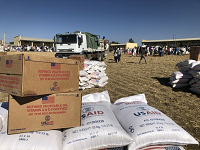In response to the devastating drought, the U.S. Agency for International Development (USAID) is providing more than $39 million in additional humanitarian aid to meet the needs of people in Ethiopia.
Currently more than 6.2 million drought affected people are estimated to need urgent food assistance in 2022. USAID is working to scale up its assistance across the Horn of Africa, including in Ethiopia, to respond to the driest conditions in four decades, according to the statement from the United States Agency for International Development (USAID).
In southern and southeastern Ethiopia, the impacts of the drought are already visible with reports of diminishing pasture lands, significant crop losses, severe water shortages, and livestock deaths.
The statement noted that through USAID partner the UN World Food Program, this additional support will provide 1.6 million drought-affected Ethiopians and refugees with food assistance, including school meals, as well as emergency nutrition for children and pregnant and lactating women.
“This builds on USAID’s ongoing assistance in drought-affected parts of the country, including the provision of food assistance to 3.4 million people and emergency nutrition to 300,000 children, as well as support for safe drinking water, sanitation, and hygiene, health care, and livelihoods.”
“The United States is the single largest donor of humanitarian assistance to Ethiopia and has a longstanding commitment to the Ethiopian people. Since the beginning of Fiscal Year 2021, the U.S. has provided more than $1 billion in humanitarian assistance to respond to needs throughout the country resulting from conflict, drought, and other crises, including $402 million from USAID to provide lifesaving assistance in drought-affected parts of the country,” the statement said.
“The United States continues to invest in our important partnership with the Government of Ethiopia at the federal, regional, and local levels. We call on other donors to join us in scaling up their assistance to respond to the dire needs caused by the drought.”

